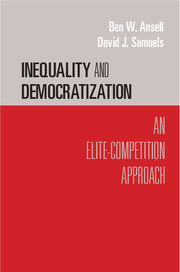Book contents
- Frontmatter
- Contents
- List of Tables
- List of Figures
- Preface
- I Introduction
- 2 Inequality, Development, and Distribution
- 3 Actors and Interests
- 4 An Elite-Competition Model of Democratization
- 5 Assessing the Relationship between Inequality and Democratization
- 6 Inequality and Democratization: Empirical Extensions
- 7 Democracy, Inequality, and Public Spending: Reassessing the Evidence
- 8 Democracy, Redistribution, and Preferences
- 9 Conclusion
- Bibliography
- Index
8 - Democracy, Redistribution, and Preferences
Published online by Cambridge University Press: 05 January 2015
- Frontmatter
- Contents
- List of Tables
- List of Figures
- Preface
- I Introduction
- 2 Inequality, Development, and Distribution
- 3 Actors and Interests
- 4 An Elite-Competition Model of Democratization
- 5 Assessing the Relationship between Inequality and Democratization
- 6 Inequality and Democratization: Empirical Extensions
- 7 Democracy, Inequality, and Public Spending: Reassessing the Evidence
- 8 Democracy, Redistribution, and Preferences
- 9 Conclusion
- Bibliography
- Index
Summary
INTRODUCTION
What do citizens in autocracies want from government? What do they want for a government? Redistributive approaches presume that individuals' opposition to redistribution increases with their income and with national-level inequality. The poorer the voter and the greater the inequality, the stronger the preferences for democracy and redistribution.
Our elite-competition approach, by contrast, presumes that relatively wealthy citizens fear expropriation by those who control the state far more than they fear redistribution to the poor, and that they believe democracy provides improved protection of life, liberty, and property. Moreover, greater overall income inequality does not signify growing redistributive threats, but the growing strength of groups demanding democracy. Except among the members of the incumbent autocratic elite, opposition to democracy should decline as individual income increases.
As we saw in the previous chapter, the arrival of democracy in countries with high levels of inequality does not herald redistribution. Instead, high income inequality means that public spending in democracies becomes distorted away from the preferences of the masses and toward those of the elites. Accordingly, the poor's preferred level of spending should decline as inequality increases in democracies.
So far, we have tested these theories by examining aggregate data: How does inequality affect democratization; how does inequality condition the effect of democratization on redistribution? Our theoretical approach would gain additional credence if these macro-patterns were bolstered by empirical support at the individual level. This is especially crucial since our theoretical approach makes a series of assumptions about the individuals' preferences over democracy, redistribution, and expropriation.
In this chapter, we consider how individual-level income and societal-level inequality shape individual-level preferences for democracy and redistribution in autocracies. Our results lend further support to our elite-competition theory. If theories rooted in the Meltzer-Richard model were correct, we should see a positive relationship between national-level inequality and demand for redistribution across autocracies, especially among the poor. However, we find the opposite effects: a negative relationship between inequality and average demand for redistribution, and a negative relationship between inequality and the importance of income in terms of determining individual redistributive preferences.
- Type
- Chapter
- Information
- Inequality and DemocratizationAn Elite-Competition Approach, pp. 171 - 202Publisher: Cambridge University PressPrint publication year: 2014



